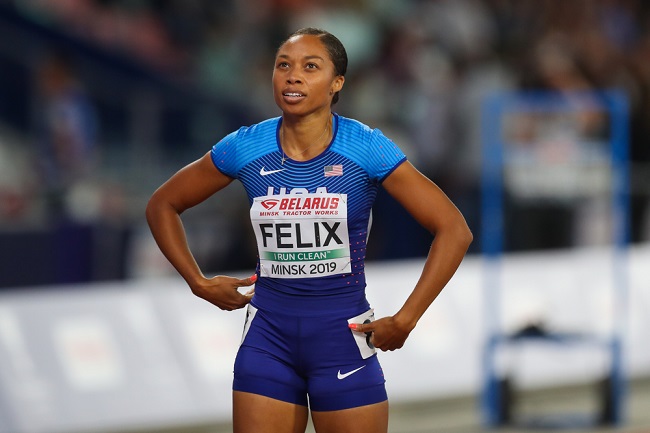Female Athlete Voices Joining Sports Sponsors Ban

But are women’s protests loud enough?
Recently the New York Times reported female athletes leaving certain major sports sponsors for smaller — but flourishing — companies. It was partly to support their and the new sponsor’s growth, but also protesting original sponsor’s sexist attitudes.
One Times example: In 2019, six-time Olympic running champ Allyson Felix left Nike for Athleta activewear, protesting the former’s “pay practices for pregnant runners.” Though her protest spurred Nike’s policy change, Felix liked that Athleta was led by women and said, “I felt like I had more value as a person and that was something I hadn’t experienced before.”
But such boycotts risk negative feedback. Sally Bergensen, founder and CEO of Seattle-based running company Oiselle, remembers taking chances when sponsoring pregnant runner Lauren Fleshman in 2013. Major sponsors were generally against such athletes, since “…they classified pregnancy as an injury,” she said, noting such a classification “is as preposterous as it sounds.”
Women keep rising, but…
Female athletes face both good and bad news when it comes to using influence to change sponsors’ images and messaging. The good news is they are at an all-time high in America, representing 40% of U.S. athletes.
And some are generating amazing influence. In an infographic of the top 50 sponsored U.S. women athletes and their roles in social media, global football star Alex Morgan ranked #1, with 43M interactions on FB, TW, and Instagram. Also on board: surfing champ Kelia Moniz, at #19 with 2.5M, and mountain biker Tahnée Seagrave at #28 with 1.8M.
The bad news is that women’s voices are not the ones sponsors generally seek, receiving only 2-4% of media coverage. Thus they’re not as influential as male colleagues, like Usain Bolt, Michael Jordan, and, far earlier, Babe Ruth.
Race and religion long a protest issue
Black athletes — and other minorities — have been taking stands for decades, but with limited positive impact early on. In 1968, Olympic track and field gold medal winners Tommie Smith and John Carlos raised their hands as equal rights protestors on the awards stand as the Star Spangled Banner played. It gained tons of discussion, but not much change…and they were suspended from the team and further events. Neither ever participated in sports again or gleaned sponsors despite growing commercialism between athletes and the media.
And yes when Jewish baseball player Sandy Koufax refused to play a 1965 World Series game because it fell on the holiest holiday — Yom Kippur — it caused some controversy…but not much change.
The 2020 aftermath
There’s no doubt that the George Floyd murder on May 25, 2020, by seemingly racist police officers truly exploded athletes’ protests — and sponsors’ more obvious changes.
As New York Times sportswriter Kurt Streeter noted, “Never before has the world of sports spoken so emphatically,” as when players in six NBA post-season playoff games walked off the field. That quiet protest echoed loudly, interrupting games and breaking through to fans that had been enjoying calm within the storm.
In spring 2020, Serena Williams posted a Huffington Post op-ed saying, “My whole life I’ve had to deal with…a lot of inequality…” then adding, “It’s sad that someone on my level has had to accept being paid less and accept so many different things because of the color of my skin.”
Long way still to true balance
Such comments lead to interesting questions: how can athletes be sure which remonstrating would truly help others, or simply shrink their sponsorship — even negate it altogether? Should it be about race or religion? What if they reveal sexual orientation, like being gay or transgender?
And how much fairer have things really gotten? Tons of sponsors quit out of events and ads that seemed to be maintaining racist attitudes after Floyd, but how genuine is that show of support?
A 2020 USA Today story reported on Gwen Berry demanding an apology from USOPC due to actions of CEO Sarah Hirshland. After the #BlackLivesMatter protests, Hirshland posted a letter saying USOPC stands “with those who demand equality.”
Berry — a U.S. Olympic hammer thrower — protested seeming hypocrisy, since Hirshland led USOPC when she was put on one-year probation after raising her fist (bringing back the ’68 event) while accepting gold in the 2019 Pan American games.
“When I took my stance, it was at a time when things were happening but nothing was being done,” she said. “… I was completely misunderstood. Now I feel like everyone feels how I felt.”
So many messages — like Williams’, Perry’s, and others — continue demonstrating that while all equality protests are stronger and achieving some results, there’s still a long process ahead.
Though based in Baltimore, MD, Wendy J. Meyeroff has been an internationally published reporter on health, fitness, and tech for both B2B and B2C audiences for over 20 years. Among her collaborations are CBS (launching it’s consumer health site), Senior Wire News Syndicate, Vision Industry Council of America, Healthcare Informatics, Good Housekeeping and Weight Watchers.



